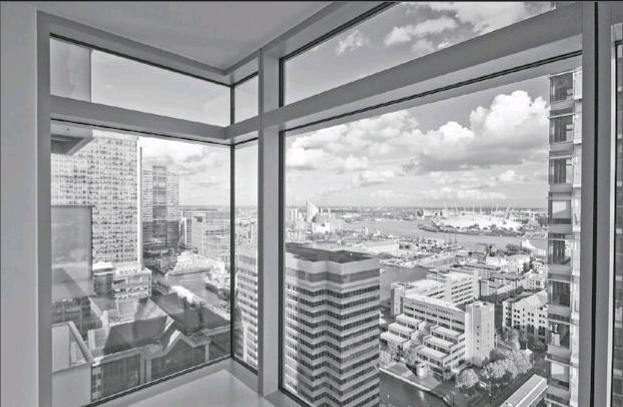Chinese Property Investors Go Crazy in London
2014-10-21


Recently, Chinese investors are fascinated with the investment into London. Their target is the property there. As the incomplete statistical data shows, the announced investment made by the investors from mainland China into the Londons property market had amounted to 3 billion pounds or 31.8 billion yuan by the end of last June.
Big real estate companies like Wanda Group is among the enthusiastic investors as well. Andrew Hawkins, deputy director of international residence department of Savills, said: “The Chinese real estate developers see the London market with new viewpoints. They see great opportunities and make great investments, hoping to grasp these opportunities.”
However, the great outlook coexists with the changes in the policies about the real estate in London. For example, the government of UK required the overseas investors to pay additional 30% tax before selling their houses in UK.
March Westward Actively
There were several Chinese investors coming to London along with Chinas premier Li Keqiang when he paid an official visit to UK last June.
The new investors were the financial institutions from China. On June 20, China Life Insurance worked with other two Chinese companies to buy 70% stakes of the 30-storey building in the Upper Ban Street in the Canary Wharf. On June 25, Construction Bank of China, which was just appointed the clearing bank of RMB business in London, acquired the office building in Broad Street in the City of London through non-public bidding. The total trading volume hits 111 million pounds.
The famous real estate developers from China are also actively seeking for proper slots in China. For example, Shanghai-based Greenland Group acquired a tract of land in the Ram Brewery in Southwest London and is going to develop a super high-rising apartment in the Canary Wharf at the bank of Thames River. The total investment amounted to 1.2 billion pounds.
The new round of investment started in 2013. In June 2013, Greenland Groups peer Wanda Group announced the 700-million-pound investment in the “Nine-Elm” project in London. The company spent 90 million pounds acquiring the land. This was the first time that the Chinese enterprises invested into the construction of high-end hotels. One month later, Pingan Insurance Group spent 260 million pounds buying the Lloyds building, the landmark building in the City of London.
In Andrew Hawkins opinion, London, which has the second largest offshore RMB business next to Hong Kong, saw the fast increase of the Chinese capital, especially the Chinese real estate developers, in the past five years.endprint
“London is always a free and competitive market,” Andrew Hawkins said.“The Chinese developers want to have success in the market. And Savills is very experienced in the real estate market in London and is able to provide specialist consultant services for the investors.
The Three Investment Methods
However, the Chinese capital is comparatively later than other foreign countries in getting into the London property market. Gerald Kaye, development director of London-based listed property development company Helical Bar, said: “We have great partners in the U.S. and Switzerland. Take the Barts Square project for example: 70% of the capital comes from our U.S. partner while the other part comes from loans and individual guarantee.”
Gerald Kaye said that Helical Bar Plc kept a good record of creditability and got along with many banks, which provides easier access to banking loans. However, no Chinese come to them for the possibility of cooperation.
“It is really a pity since our experience and skills can help the Chinese companies a lot in the London property market,” he said.
Presently, Chinese investors invest into the property in London via three methods: some non-specialist property developers directly choose to acquire existing buildings or properties. The targets are mostly the historical or landmark buildings; some investors choose to acquire the London-based property companies or institutions with properties through stake purchasing; some investors choose to set up subsidiary companies in London to take charge of acquisition and operation of real estate projects.
The key to attract the Chinese investment is the good yield that has been available for years. The projects Pingan Insurance and China Life Insurance in the past few years all had the annual investment returns of 5%-6%.
As an experienced developer, Ger- ald Kaye says that the yield of commercial property projects is almost the same– 4.5% – with the one of residential property project. With the increase in the value of real estate project, the yield will get higher and higher in the future.
Big Boom in Housing Price of London
The high yield in the property of London and UK is once thought to be the result of the increasing housing price which is driven by the overseas investors swarming into this market.
“Actually, less than 10% of the property investors come from the overseas. The proportion is still very low,”said Hawkins. The overseas investors are now functioning as a long-term stabilizer of the housing price in London and they are not influential enough to affect the housing price.endprint
The real reason to push the housing price up and the high yield is the huge demand for the houses in London. The market has high requirements of the newly-built buildings quality. In addition, London is an old city with centuries development, leaving a little space for the new buildings.
Hawkins forecasts that there will not be a lot of new houses thrown in the market in the next 20 years. The statistical data shows that the supply of new houses in London in the next five or six years will have a gap of 200 thousand units compared with the market demand. In addition, he believes that the housing price in London will go up 20%-25% in the next five or six years.
Apart from the residential property project, the rent for commercial property is also rising at a high speed. Many local large real estate enterprises like Helical Bar are now following the strategies of diversification as they are focused on both the commercial and residential property projects.
Tax for Overseas Investors
According to Hawkins, the British government is very likely to work out a new law, allowing the investors from China and other foreign countries to get the visa and personally come to the construction projects in London more quickly than ever before. Meanwhile, the branch of Construction Bank of China which is still under planning has promised to provide the pound-based loans for Chinese investors.
But a plan of the British government might be bad news for the overseas investors. The change of the individual tax had given the international investors and local house dealers the equal status. Previously, foreign investors do not need to pay the tax for their selling of the property projects while local people need to pay the dealing tax.
As Hawkins says, now both the foreign and local investors need to pay the tax. The tax rate varies from 10% to 30% based on the value of the property and the duration of the ownership. Presently, the changes will not have big influence over the market.
Another big change is about the policy for the mortgages in China. Recently, the increase of mortgages in UK is slower than before even though the housing price rockets up very quickly.
An actuarial expert with a Shanghaibased insurance company says that there has been a debate over the property bubbles in London. If the said bubbles really scare the Chinese investors away, there will a huge problem for the Chinese investors. endprint
endprint
